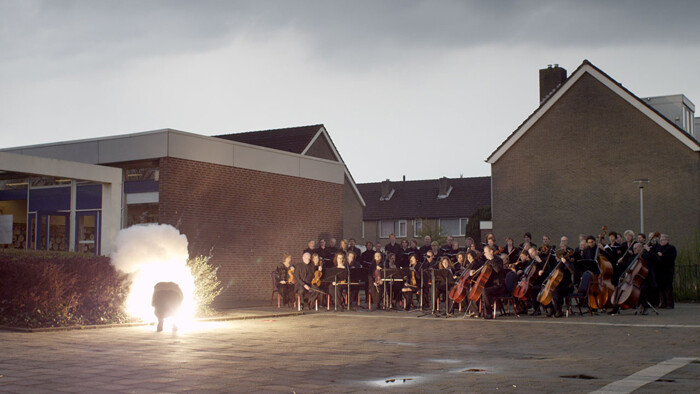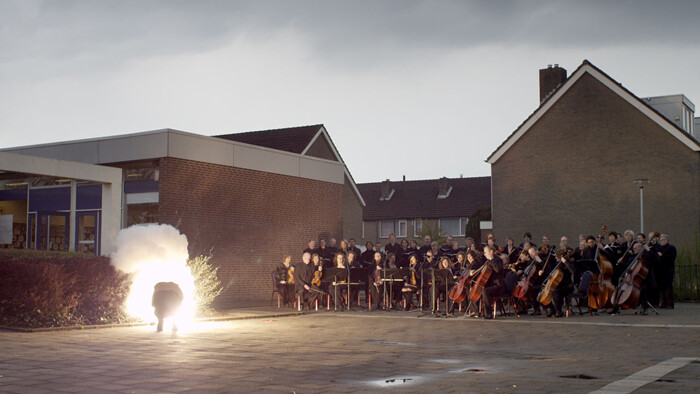I’m just about to cry when he goes and does something ridiculous.
My weepiness is more a wet testament to my propensity to weep than it is in the weepworthiness of whatever I’m watching, which in this case is Guido van der Werve in his latest film, Nummer veertien, home (2012). On this mission, van der Werve again experiments with how much dour Dutch Romanticism one can pour into epically beautiful tableaux and heartbreaking musical scores before it’s too much. When his pathos threatens to foam over into self-serious kitsch, he does something silly. Pathos turns bathos with a dollop of self-aware slapstick. The second doesn’t exactly cancel out the first but it certainly cuts the froth. It’s as if the artist is self-conscious of the oppressive seriousness of it all and is trying to throw us a bone.
Most of his previous films (numbered chronologically two through thirteen in untranslated Dutch) mix the sublime with the ludicrous. High art forms are played in unusual places: a piano and orchestra float on separate barges in a picturesque river or ballerinas prance in the street. These are usually mixed with some deadpan comedy, the artist getting smeared by a car right before the ballerinas show up, pouring out of a police van. These moments, especially early on, were genuinely likable and often, especially in Nummer Acht: Everything is going to be alright (2007), beautiful. Though his current film has a bevy of absurd moments, the jokes feel a little forced, lost in the folds of a muddled story.
The convoluted premises of this film are explainable even if its logic isn’t necessarily. When nineteenth-century Romantic composer Frédéric Chopin left Poland, he toted a silver cup cradling native soil to his new home in France. Upon his death, he was mostly buried at the Père Lachaise Cemetery in Paris. Only mostly because he had his heart smuggled out of the country by his sister back to the motherland. So, van der Werve decides to perform multiple triathlons—from Holy Cross Church (the last resting place of Chopin’s heart) to Père Lachaise—to deliver a tin can of dirt from Chopin’s birthplace (stopped at en route). During this run, full orchestras on- and off-camera perform a requiem composed by the artist in settings both grand and mundane, from a duo of magnificent churches to modern apartment blocks and suburbs. Oh, and then, somehow the story of Alexander the Great is mixed in: the Macedonian conqueror’s birthplace, site of trials, the river where his empire could push no further. Somebody at the gallery told me that the more ordinary locations are connected to van der Werve’s own life, his birthplace, etc.
I could pluck out some theses about the difficulty of a triathlon, the current permeability of European borders and empire, the changing nature of landscape, an individual setting out to overcome great difficulty, the fact that the word “triathlon” is Greek, but these are mostly surreal leaps at best. There is nothing that connects Chopin’s story to a triathlon. Or multiple triathlons. Or Alexander the Great. Maybe they don’t wholly fail to interlock with pathos to bathos and back again: Alexander the Great and/or Chopin versus the more humble van der Werve and his challenges, but it’s enormously ballsy to compare one’s own struggle with these figures, one who needs no last name and the other who needs no first. And then, why is the artist lifted by a heavy-duty industrial crane out from in front of the apartment complex and high into the sky? Why does he stroll in front of a band in the suburban park on fire and fall into a stream? Why does he, in the least charmingly low-fi of the special effects, kneel contemplatively in front of a bush at an apartment block only to blow up in burst of light? I could hazard some guesses about heavenward heroes and spontaneous combustion, but mostly the conceptual narrative seemed abstruse, the illogic unnatural, the endless location shots and special effects—not to mention getting a full orchestra to so many weird places—simply expensive. Coupled with his physical tests of endurance, it feels less like Wordsworth’s “spontaneous overflow of emotion recollected in tranquility” but a numbness causing itself suffering to feel anything at all.
Trying to weave these disparate elements into some kind of working narrative perhaps isn’t really the point. The quiet beauty of the tableaux, the on-cue unfunny gags, the grandiosity of it all, it sort of works. Less a piece of visual art, it succeeds as a visually compelling vehicle for the musical composition. Though I pretend no expertise in classical music, the score was lovely, especially as a compendium to the often chilly and pristine series of images on the screen. It’s unlikely that I would drive across town to sit in a dark room to listen to a recording of an hour-long requiem, but I did and, more or less, enjoyed it. The images are nice to look at, the sounds pleasing to the ear.
Despite all the invocations of Romanticism, however, there isn’t exactly an excess of sentiment in the end, but merely references to it. You don’t see van der Werve break down in tears; in fact, it’s the exact opposite: he’s in utter control the entire film, from the long steady landscape shots to his cool self-possession in the triathlon. In another recent short film made for MTV called Concert for Piano and the Exact Volume of Tears Cried on Earth at any Given Moment (or 211,5 liters per second) (2012), the artist plays a piano outdoors in the green grass overlooking a lake, when suddenly a geyser of water shoots into the sky, presumably pumping out 211.5 liters a second, soaking the performer. The suffering suggested by the tears is quantified, in an “exact” amount, with little attention to what it might actually mean to weep, the artist drowning in it, this empty number. Especially in earlier works, a joke like this one might have saved the work from the muck of pretension, but they also kind of ruined the possibility of overwhelming emotions, revealing how little emotion there actually was.
For those with suffering not self-inflicted, it’s okay to understand how irrational and ridiculous emotion can be—and weep anyway, surrendering to tears that are unquantifiable.








